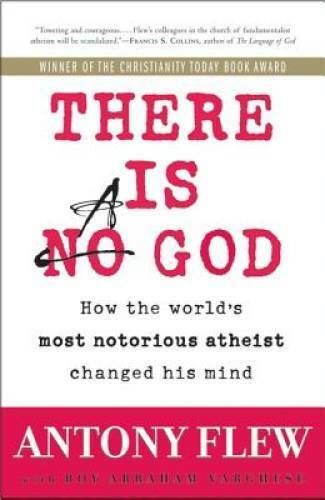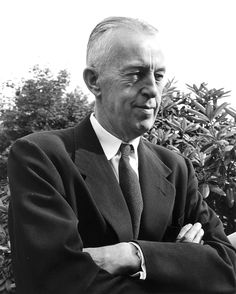The Atheist, the Alcoholic, and the Unknown God
In the Gospel of Matthew, chapter 17, the Lord tells the Disciples that they can move mountains if their faith is as small as a mustard seed. How many of us have read that passage and pondered what such faith might look like? A mustard seed is only one or two millimeters in diameter. It’s tiny. What could God possibly do with faith that small? Consider the following:
The Atheist

Antony Flew (1923 – 2010) is widely thought to be the preeminent atheist of the 20th century. More than seven decades ago he set the agenda for modern atheism with Theology and Falsification, a paper he presented in a debate with the famous Christian apologist C.S. Lewis.
Flew’s philosophical works have left an indelible mark on modern thought and discourse. The so-called New Atheists, for example, incorporated his work into their flame-throwing agendas. They revel in excoriating and ridiculing people for simply believing in God. Flew’s ‘presumption of atheism’ is a frequent topic of their podcasts. We see its influence every time someone butts onto a social media thread and claims that everyone who believes in God is crazy but refuses to rationally defend their remarks. It was Flew who planted the philosophical seeds in which today’s social climate of intolerance and ignorance makes these hit-and-run episodes all too common.
Curiously, Flew himself never joined in the antics of his New Atheist associates. We see the reason why only in hindsight. In publications the professor still exhibited a detached, academic interest in “following the evidence wherever it may lead.” Yet privately – unknown to the world at large – Flew was a consummate seeker who was relentless in his search for hard evidence of God’s existence. On the debate circuit he even made friendships with Christian scholars. Out of the spotlight they collaborated by exchanging correspondence and telephone calls about scientific developments and their theistic implications. The world was understandably shocked when, in May of 2004, Professor Flew arrived to a debate and announced that he now believed in God.
It happened at New York University. Of that “debate” Flew later said “What might have been an intense exchange of opposing views ended up as a joint exploration of the developments in modern science that seemed to point to a higher Intelligence.” In the video of the event, the announcer suggested that of all the great discoveries of modern science, the greatest was God. The New Atheists were red-faced, scandalized (imagine if Billy Graham had shown up to a revival and announced that he had become an atheist). Not surprisingly, Flew was never invited to appear on behalf of the atheists again.
Flew went on to publish There Is No A God. Beginning with the plainest of premises – that “nothing comes from nothing” – Flew appraised three discrete phenomena: the existence of the laws of nature, of life, and of the universe itself. It isn’t simply that our present science is ill-equipped to naturally explain these, Flew said; rather, science can never explain these apart from an immensely intelligent, all-powerful Creator. The relevant sciences have reached the point where we safely can say that God is behind it all. Flew also quoted scientific giants like Albert Einstein, Charles Darwin, Erwin Schrödinger, and many others who expressed a belief in God.
As one might imagine, upon hearing about this, the New Atheists became completely unglued. The old man’s gone mad, they cried. They charged him with senility, and some bizarrely claimed that unscrupulous, Christian opportunists had hijacked his brain. Yet Flew dismissed these naysayers in writings and television interviews until his death in 2010.
Today, Antony Flew’s personal story continues to inspire Christians who value the natural sciences. The man who once set the agenda for modern atheism had calmly weighed the evidence and now believed in God. His book has become a recommended primer for anybody wanting to understand how humanity’s greatest scientific discoveries actually complement and defend, not contradict, a faith in God. It still holds places on Amazon’s bestseller lists for both religious studies and atheism.
The Alcoholic

William Griffith Wilson (1895 – 1971) was born in the hamlet of Danby, Vermont, at the Wilson Hotel. Fittingly, it happened in a room behind the hotel bar. From his mother he inherited brains, and from his father, brawn, along with a family history of alcoholism. In fact, Wilson had been warned from an early age about the family experience with alcohol. His father, who left when Wilson was a boy, drank heavily, and his grandfather had been an alcoholic. Wilson grew up frightened of liquor and backed away from it during his youth and throughout college. That changed during his military service when Wilson accepted a drink at a society gathering. It was like magic; the shy and self-conscious young man became the life of the party.
During a period of sixteen years, alcohol became the defining fact of Wilson’s life. His marriage and lucrative career as a stock analyst naturally disintegrated into shambles. A dismayed Wilson was completely baffled by his inability to stop drinking. He’d had countless chances, and more than enough motivation and personal desire – all to no avail. He then received a visit from an old drinking buddy who claimed that the “Great Physician” had saved him of his own alcoholic obsession. It had been lifted right out of him, his friend said; he was completely freed.
Wilson went to the friend’s Christian fellowship and met others who declared the same thing. Although impressed by their recoveries, Wilson chafed at the idea that it had anything to do with God. He’d never studied the Bible or been a churchgoer, and he asked himself whether they recovered through reality or by an illusion. Now, Wilson didn’t question that there was a power greater than himself. He even thought there may be a spirit of the universe that supported the vast laws and forces at work in the cosmos. A personal god, however, seemed improbable, even unreal, to him. With the ministers and religions of the world, he sharply parted company. He thought himself, in his own words, “incapable of such an absurd illusion, even though it might save [his] life for a little while.”
During Wilson’s last hospitalization his doctor pronounced him hopeless. His course was set: decaying health, madness, and death. Later that night, sitting alone in his hospital room, Wilson felt his obstinacy toward God crushed out of him. He even said to himself, “I’ll do anything, anything at all. If there be a Great Physician, I’ll call on him.” Wilson then humbly offered himself to God and had a remarkable spiritual experience. The effect was instant and electric; he became conscious of “the God of the preachers.”
An excited Wilson told everybody at the hospital about his experience. His obsession to drink was gone. It was a miracle, but how, and why? The Christian fellowship provided him a book by the psychologist William James, The Varieties of Religious Experience. Wilson readily saw himself within the pages: his calamity, admission of complete defeat, and appeal to God. As he contemplated his own experience, however, Wilson came to appreciate the critical importance of his Christian friend. Without this friend’s guidance, the thought of seeking God would never have occurred to him. As a fellow alcoholic, he had identified himself with Wilson as no other person could. He had pointed the way out of the cave of darkness and into the sunshine of the spirit.
It was a powerful epiphany. Wilson began to envision a “chain reaction,” an ever growing fellowship of alcoholics whose mission would be to point other sufferers toward God. Such a fellowship ultimately might reach every alcoholic in the world, Wilson thought, and he immediately began working toward that goal. He eventually met an alcoholic and physician whose name was Robert Holbrook Smith.
Bill W and Dr. Bob, as the duo came to be known, collaborated together and began helping other alcoholics find God. They also put together a book, Alcoholics Anonymous, that distills the recovery program into twelve steps. The rest is history.
Today, there are AA groups in 180 countries with an estimated membership of more than five million people. Bill W’s wife became a founding member of Alanon, and dozens of groups have adopted the 12 Steps to address a wide variety of compulsive behaviors. Since these groups don’t keep statistics, it’s impossible to say how many people have been led to God by the 12 Steps, but the number must be considerable. At CORE, in our little corner of the world, our staff does not have enough fingers and toes to count them all.
The Unknown God

The New Testament contains a record of Christianity’s spread into Asia Minor and Europe. In the Book of Acts, chapter 17, we find an account of Paul in the idol-filled city of Athens making his famous address to the Areopagus, the Athenian council. Paul stands up before the assembly and says, in pertinent part:
“People of Athens! I see that in every way you are very religious. For as I walked around and looked carefully at your objects of worship, I even found an altar with this inscription: TO AN UNKNOWN GOD. So you are ignorant of the very thing you worship – and this is what I am going to proclaim to you.
The God who made the world and everything in it is the Lord of heaven and earth and does not live in temples built by human hands. . . .From one man he made all the nations, that they should inhabit the whole earth; and he marked the boundaries of their lands. God did this so that they would seek him and perhaps reach out for him and find him, though he is not far from any one of us. ‘For in him we live and move and have our being.’ As some of your own poets have said, ‘We are his offspring.’”
From Paul’s remarks we have a fair idea where the Athenians are in their beliefs. Rather than condemning them as idol-worshiping savages, however, Paul acknowledges that they are a religious people. Athens, after all, is the cultural center of the Roman Empire. When he says, “you are ignorant of the very thing you worship,” his remark is neither meant nor taken as disparagement. Moreover, the fact that he proclaims The Unknown God is an attention grabber, both for them and for us today.
Paul’s discourse does not begin with, nor is it carried by, references to scripture. We do not see the typical survey of Israel’s history, for example, and there are no quotations from the Pentateuch or The Prophets. He doesn’t even mention the word ‘Messiah,’ and for an obvious reason. He’s not in a Jewish synagogue. For authority Paul quotes two pagan authors, the Cretan philosopher Epimenides and the Cilician Stoic philosopher Aratus. Paul is speaking to these people where they are.
They appear to hear Paul loud and clear, too. We know this because Luke faithfully records where an objection is made, and there are none on these matters. Paul is expounding a natural theology that already is part of the public consciousness. Philosophers like Plato, Socrates, and others had been developing it for centuries. Upon this Paul argues toward his ultimate conclusion: that God the creator has revealed Himself in the man Jesus.
In this city full of pagan idols, it happens that there are seekers in the audience who want to reach out and find God. Sympathetic Athenians convert that same day. They form the foundation for what eventually became an important center of early Christianity. Moreover, we easily imagine Paul making a similar address to crowds throughout his travels in pagan Europe. He became, in his own words, “all things to all people” and spoke to them as one “without the law.” Small churches sprang up everywhere Paul went. The impact upon the world made by these original seekers of The Unknown God is all around us, even today.
Willingness is Key
God can accomplish great things with even a little faith. As a recovery provider, we at CORE consider the above examples (and many others like them) for more than their emotional appeal. Step Two says that we “[c]ame to believe that a Power greater than ourselves could restore us to sanity.” Step Three says that we made a decision “to turn our will and our lives over to the care of God as we understood Him.” CORE receives clients who hold a myriad of different beliefs. Our staff counsels individuals who wonder if they really believe in God, for example. They ask if they are religious enough to work the steps, or they want to know what minimum amount of belief is needed. Thus, our interest in this is beyond theoretical. Belief is “a thing” around here, a practical matter of immediate and grave importance, because recovery can be a matter of life and death.
Our experience, echoed by the Big Book, is that “God does not make too hard terms with those who seek Him.” Id., at 46. Therefore, willingness is key. It’s great if we already have faith, but even by expressing a willingness to believe, we commence to get results. We see this quality in the atheist, the alcoholic, and Athenians above. All were seekers, and their willingness to believe lit a flame that has gone on to inspire millions and accomplish immeasurable good. God does remarkable things with a ready attitude. Pertinently, this also includes someone suffering from a seemingly hopeless obsession for drugs and alcohol. In the 12 Step context, a simple attitude of willingness to believe can become the “cornerstone” upon which “a wonderfully effective spiritual structure” is built. Id., at 47.
We see this all the time. CORE’s ministry is not dissimilar from a college ministry, where members not only have different backgrounds and beliefs but also are highly mobile and continually come and go. Our church attendance is about three hundred people. In an ordinary year we might have fifty baptisms, and even more commence our recovery program. Ours is an active ministry, and for everyone who finds new life we rejoice and give all glory to God.
So, exactly how much faith is needed to work the 12 Steps? This matter is not readily quantified, but a client can only be defeated by a persistent attitude of intolerance and belligerent denial. We like to think of the story about Jonah and his shipmates tossed to and fro upon the frothy sea. The shipmates must throw Jonah overboard, he exclaims, so that God will quiet the storm. They don’t even know Jonah’s God and resist his plan. As their efforts to row ashore fail, however, in desperation they call out to God and put Jonah into the water. The raging sea grows calm, and Jonah’s shipmates believe. They then dedicate themselves to the Lord.
The story is a fitting allegory for some who need the experience of their addictions in order to reach the place of willingness to seek out and find Him. Nevertheless, once we make the decision to turn our will and lives over to the care of God, He turns out to be closer to us than we ever imagined. He quiets the raging storm within us, and we believe. We are filled with gratitude, and we become determined to pass along a message of hope to other addicts and alcoholics: that God will do for them what they cannot do for themselves.
